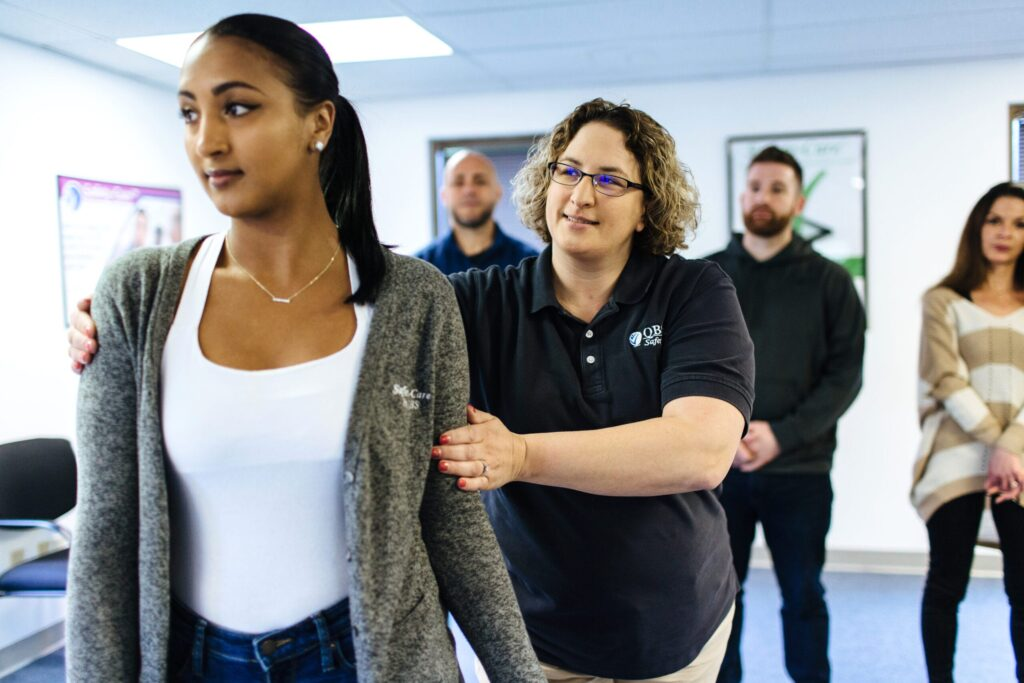New Hampshire – Dementia Training for Direct Care Staff
Starting in January of 2020, direct care staff in medical facilities in the state of New Hampshire were required to have specific training related to the care of staff with dementia. Below is a summary of these requirements and information regarding how Safety-Care can be used to meet these training needs.

.png?width=88&height=95&name=Group%20137%20(5).png)


How to Implement Safety-Care?
1. Register for a Safety-Care Trainer class or call us to request a closed session for your organization. We regularly conduct classes in all 50 states and Canada.
2. Complete your class to become a certified Safety-Care Trainer for your organization. We bring you to fluency using an errorless teaching methodology.
3. You train and certify your staff in Safety-Care’s effective techniques.
4. Our Master Trainers are available by phone, email, or video to help your organization with any questions or concerns while using or implementing Safety-Care.

Legal Requirements
|
Summary: Effective: January 1, 2020 Last Updated: December, 2024 Starting in January of 2020, direct care staff in medical facilities in the state of New Hampshire were required to have specific training related to the care of staff with dementia. Below is a summary of these requirements and information regarding how Safety-Care can be used to meet these training needs. How Safety-Care aligns: Numerous health organizations throughout the United States and Canada rely upon QBS and our Safety-Care training to provide their staff members with the training they need to help maintain a safe and healthy environment. Safety-Care provides a comprehensive, supportive approach to incident prevention, de-escalation, and management. Your Staff will learn practical strategies for helping students that use evidence-based practices consistent with PBIS (Positive Behavior Interventions and Supports) and ABA (Applied Behavior Analysis). |
|
Facilities and programs are now required to provide initial training to all covered staff members hired on or after July 1, 2019, who shall complete initial training within 6 months of the start of employment. All covered staff members who were employed prior to the date and who have not received equivalent training shall complete initial training within 6 months of July 1, 2019. For covered direct service staff members and covered administrative staff members, at a minimum, the curriculum used for the initial training shall adhere to the latest nationwide Alzheimer's Association Dementia Care Practice Recommendations and, at a minimum, cover the following topics:
|
|
"Covered administrative staff member" means the senior manager of the facility or program, including administrators, as well as managerial staff members that directly supervise covered direct service staff members. "Other covered staff member" means a staff member who has incidental contact on a recurring basis with residents or program participants, including housekeeping staff, front desk staff, maintenance staff, other administrative staff, and other individuals who have such incidental contact. The facility or staff shall issue a certificate to covered staff members upon completion of initial training, which shall be portable between settings. Provided that the covered staff member does not have a lapse of dementia related direct service or administration employment for 24 consecutive months or more, the covered staff member shall not be required to repeat the initial dementia training. Persons responsible for conducting in-person dementia trainings shall meet minimum criteria including: 2 years of work experience related to Alzheimer's disease or other dementias or in health care, gerontology, or other related field; and have completed training equivalent to the requirements noted above. How Safety-Care aligns: Safety-Care is uniquely designed to provide trainees with the skills to assess potential crises, how de-escalate these situations, and how to respond if the situation is elevated. Our trainings are trauma-informed and focus on modifying behavior to prevent dangerous outcomes. Safety-Care can be taught to all levels of personnel, from administration down to volunteers. Additionally, our core trainings can be supplemented with unique add-on trainings focused on specific needs and professions. Safety-Care uses a Train the Trainer model allowing each district to quickly develop their own core of trainers qualified in the most current behavioral interventions and de-escalation strategies. Our Master Trainers can have up to ten (10) staff ready to train in as little as three days. Safety-Care is geared towards ensuring that all trainees are familiar with a single response system and can respond in-kind to numerous situations regardless of the professional setting. |
Why Safety-Care?
Benefits & Differentiators
In addition to Safety-Care being highly cost-effective, you get:

Skills to effectively prevent, minimize, & manage behavioral challenges with dignity, safety, & the possibility of change

Decreases in staff and patient injuries and reduction in restraint & seclusion time

Instructional procedures based on decades of evidence-based research & compatible with ABA, PBIS & reinforcement-based environments

Customizable program for your setting, staff & clientele, with a strong focus on preventative via non-intrusive, replacement behaviors

Extremely rigorous standards grounded in errorless teaching methodology

Small, intimate class sizes backed by unlimited support & resources
How Is Safety-Care So Effective?
A Genuine Focus on Implementing & Managing Positive Behavioral Skills
Proactive, environmental management recommendations
Understanding of evocative effects of staff behavior
In-depth analysis of antecedents and proactive antecedent interventions
Evidence-based reinforcement procedures
Required competency in de-escalation skills
Humane, non-invasive touch and QBS Check™ strategies
Evidence-based teaching procedures
Applicable to a wide array of settings, conditions & challenging behavior





